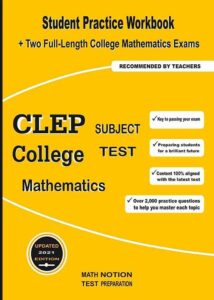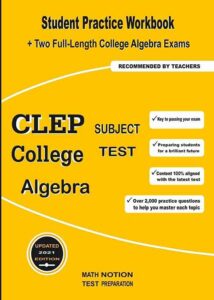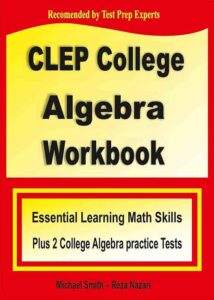
Study Time: 5minutes
How to Prepare for the College CLEP Test
The College Level Examination Program (CLEP) presents a unique opportunity for students to validate their prior knowledge in college subjects and earn credits without attending traditional classes. This program offers exams in 35 diverse subjects, aiming to facilitate a faster and more cost-effective route to a college degree. Understanding the nuances of the CLEP exam is essential for maximizing its benefits.Aspiring to fast-track your college education? The College Level Examination Program (CLEP) presents a unique opportunity for students to validate their existing knowledge in various subjects and earn college credits.
The CLEP College Algebra test covers material that is normally instructed in a one-semester school course in variable-based math. Almost a large portion of the test is comprised of routine issues requiring fundamental arithmetical abilities; the rest tackling nonroutine issues in which test takers should exhibit their comprehension of ideas. The CLEP College test remembers problems for fundamental mathematical tasks; direct and quadratic conditions, inequalities and diagrams, algebraic, exponential, and logarithmic questions.
It’s accepted that test takers know about as of now showed mathematical vocabulary, symbols, and documentation. The test puts little mathematical computations on number juggling computations. Nonetheless, a web-based logical calculator (non graphing) will be accessible during the test.
The test contains roughly 60 problems to be solved in an hour and a half. A portion of these is pretest questions that will not be scored.
Why Choose CLEP?
CLEP offers several advantages:
Accelerated Coursework: CLEP enables students to bypass introductory courses, propelling them into advanced studies quicker.
Cost Savings: By passing CLEP exams, students can reduce their tuition expenses significantly.
Military Benefits: The U.S. government fully funds CLEP exams for active military personnel and eligible family members, aiding them in achieving their educational goals.
Understanding CLEP Policies at Institutions
Each college has its own CLEP policy, determining:
Which CLEP exams are accepted for credit.
Minimum scores required for credit eligibility.
The amount of credit awarded per exam.
While many colleges recognize CLEP, not all 33 exams are universally accepted. Some institutions may also require higher or lower scores for credit than the typical benchmark score of 50.
Focusing on CLEP Mathematics
CLEP College Mathematics and CLEP College Algebra are two popular choices within the CLEP spectrum.
CLEP College Mathematics
This exam encompasses a range of topics typically taught in undergraduate math courses, including set theory, logic, real numbers, functions, probability, statistics, and elements of algebra and geometry. It’s designed to test foundational mathematical knowledge and problem-solving skills.
CLEP College Algebra
Targeting material usually covered in a one-semester college algebra course, this exam includes routine problems that test basic arithmetic skills and more complex questions requiring conceptual understanding. Topics include basic operations, linear and quadratic equations, graphing, and logarithmic functions. Test-takers are expected to be familiar with standard mathematical terminology and notation.
Preparation Tips for CLEP
Understand the Exam Format: Familiarize yourself with the structure and types of questions on the CLEP exams.
Focus on Key Subjects: Identify the CLEP exams that align with your strengths and study needs.
Utilize Study Resources: Take advantage of study guides and online resources tailored for CLEP preparation.
Practice Tests: Engage in practice exams to get a feel for the timing and question format.
Brush Up on Basics: Ensure a strong grasp of fundamental concepts, especially in mathematics.
Time Management: Develop effective strategies to efficiently navigate through the exam within the allotted time.
Seek Support: Join study groups or engage a tutor for areas where you need more guidance.
Conclusion
Preparing for the CLEP exam requires a strategic approach, focusing on key subjects, and making use of the myriad of resources available. By understanding the exam structure, familiarizing yourself with the subject matter, and committing to consistent practice, you can unlock the door to significant college credit and a more streamlined educational journey. Remember, the effort you put into preparing for CLEP can significantly shorten your path to achieving your academic and career goals.





